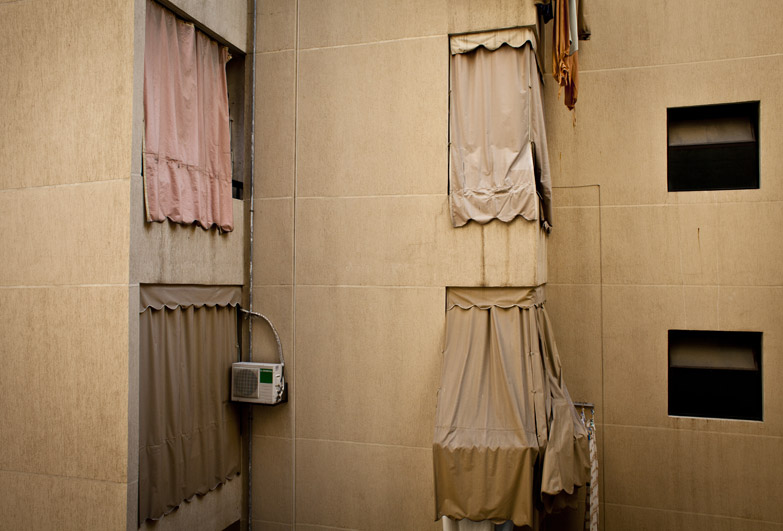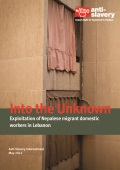New report: Widespread abuse of Nepalese migrant domestic workers in Lebanon a direct consequence of the systems in place in both countries.

7 May 2014
New research looking at the vulnerabilities to widespread abuse of Nepalese migrant domestic workers in Lebanon rooted directly in the systems in place in both home and destination countries. It also looks at the work Anti-Slavery and its partners have done to reduce these vulnerabilities and the first signs of change.

Download the report in PDF: Into the Unknown (1800.03KB)
‘Into the unknown’ is a new research focusing on the situation faced by thousands of Nepali women when they migrate to Lebanon to work as domestic workers. The report looks at the work Anti-Slavery and its partners KAFA and GEFONT have done in the last two years to reduce the vulnerability of these women to abuse and offers an overview of the first signs of change.
In Lebanon alone, there is currently an estimated 200,000 migrant domestic workers, including estimated 12,000 from Nepal. They commonly suffer from poor living conditions, long working hours, no days off, being locked in the house, confiscation of passports, non-payment of wages as well as physical and sexual abuse.
The report points to a complete vacuum in relation to the protection of migrant domestic workers as a result of inadequate and sometimes counter productive policies and practices from both Nepalese and Lebanese governments.
In Lebanon the single biggest factor facilitating exploitation is the sponsorship system, or kafala, which ties workers’ resident permits to single employers. Employers are legally responsible for the worker, which they interpret as meaning not allowing them out of the house without their supervision.
Those who flee an abusive employer are at risk of arrest, detention and deportation, whilst the perpetrators of abuse go largely unpunished.
Domestic workers are not included in the Labour Law, denying them rights other workers enjoy such as minimum wage, annual and sick leave, maximum work hours or the right to organise.
In Nepal, the lack of regulation of recruitment agencies means many women fall into bonded labour as a result of the transportation and recruitment costs, as well as the commission fees charged by the agent
Nepal’s response to numerous cases of abuse was to introduce an official ban for women under 30 travelling for work to Lebanon. However, the ban, rather than protect them, make migrant workers seek unofficial routes of migration and therefore hamper the ability to receive support and representation from their own government.
Despite the large numbers of Nepalese migrant workers in Lebanon, Nepal has not established an Embassy or a Consulate there, denying them what is often the last place of protection, assistance and refuge.
Nepal also fails to provide any meaningful training on safe migration for domestic workers travelling for work abroad, increasing their vulnerability to exploitative practices at every stage of the migration process.
Anti-Slavery International has been working to address the vulnerabilities of women with its local partners, KAFA in Lebanon and GEFONT in Nepal.
In Nepal, work is focusing on bringing relevant pre-departure information to potential female migrants in a format they can easily rely on, which is crucial for making migration safer for women. The information is relayed by members of the community called Female Community Health Volunteers who have been trained on issues of safe migration, especially for women migrating for domestic work.
In Lebanon, the project also supports the development of the Nepalese community of migrant domestic workers, under the NARI group, to empower them to support each other and stand up for their own rights.
The work is also focusing on advocating change of policies in both countries, especially:
- Ratifying ILO convention 189 on Decent Work for Domestic Workers, providing all domestic workers with the rights and protection to which they are entitled,
- Abolishing the kafala system, and in a shorter term remove the need of employer to authorise the worker to leave their employment and grant these workers a grace period during which they are allowed to seek a new employer/sponsor.
- Including domestic workers in labour laws:
- Providing accessible and relevant pre-departure information to all potential migrants
- Regulate recruitment agencies and monitor recruitment practices
- Harmonise policy and practice in relation to migration for domestic work in Nepal, especially removing the ban and supporting migrant workers before they leave the country
- Establish an embassy in Lebanon
- Support the self-organising of migrant domestic workers with the view of organising them in unions
Audrey Guichon, Domestic Work Programme Co-ordinator at Anti-Slavery International said:
‘This report shows not only the extent of vulnerability suffered by migrant domestic workers travelling to Lebanon for work but also the fact that both Nepal’s and Lebanon’s policies are the very source of these vulnerabilities.
‘Lebanon should abolish the kafala system that facilitates the exploitation domestic workers commonly face, and Nepal should stop putting their head in the sand and start proactively supporting their citizens in facilitating safe migration.
‘I hope our work bearing first good results can an inspiration for both countries to introduce the policies that will truly protect the migrant domestic workers at their workplaces.’